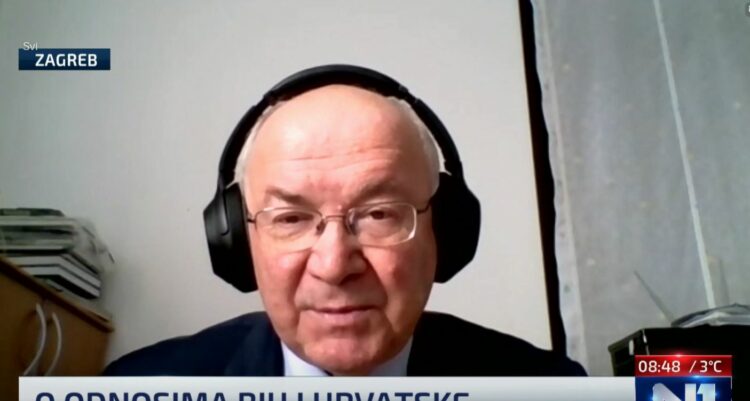
The Dayton Peace Agreement, which ended the 1992-1995 war in Bosnia, brought peace to the country, but had the Croat side known it would be implemented in the way it is done today, it would have never signed it, former Croatian Foreign Minister Mate Granic told N1 Tuesday.
“What I'm dissatisfied with are the changes to the Dayton Peace Agreement caused by the High Representative's decisions, which are a step back. Not even the Constitutional Court's decisions are respected nor those of the European Court of Human Rights,” Granic said and noted:
“On January 1, 1994, when Haris Silajdzic (a Bosniak member of Bosnia's negotiating team), Kresimir Zubak (a Croat member of Bosnia's negotiating team), and I signed the Washington Agreement. Days earlier, Silajdzic and I talked and agreed that the Federation entity would consist of constituent peoples and all the Others so that everyone would have the same, civic rights. That's when we agreed to transfer that model to the rest of Bosnia and that Serbs would also be a constituent people,” Granic told N1.
But, according to him, the office of the High Representative, which oversees the civilian implementation of the Agreement that ended the war in Bosnia which, at one point, involved Bosniaks (Bosnian Muslims), Serbs aided by Serbia and Croats, aided by Croatia – all fighting for their interests.
Bosniaks sought to preserve the unity of the country after Serb forces aided by Serbian military and logistics declared the independence of the region now known as Republika Srpska entity. Seeing this, Bosnian Croats sought to create their own state in the south of Bosnia, called Herzeg-Bosna.
The US-brokered Dayton Peace Agreement stopped the war after the 1995 Srebrenica genocide, leaving the country externally unified but subdivided into two entities internally – the Bosniak-Croat shared Federation and Serb-dominated Republika Srpska.
The Agreement also created Bosnia's Constitution which gave all the power to the entities, leaving state institutions weak and dependent on entity authorities.
“It would be best if Bosnian politicians would agree on the election of the tripartite Presidency in the spirit of the Dayton Agreement as it was signed back then,” Granic said, implying to the position of the Croat member of Bosnia's tripartite Presidency.
Namely, after the last general election in the country, the position was occupied by Zeljko Komsic, a centre-left politician from the Democratic Front party, who is an ethnic Croat. His election was disputed by all the leading ethnic oriented Croat parties in the country, as well as the Republic of Croatia, claiming he is not a legitimate Croat representative and that he was elected by Bosniak voters, as the Croat-Democratic Union's (HDZ BiH) candidate and leader Dragan Covic, backed by all the major ethnic-oriented Croat parties in the country, lost to him.
Bosnian Constitution stipulates, however, that the presidency will consist of representatives of one of each constituent peoples, a Serb member elected in the Republika Srpska entity, and Croat and Bosniak members who are elected in the Federation entity. Nowhere does it say the members must be legitimate representatives of those peoples.
“Croatia signed both Washington and the Dayton Agreement, and as I was the negotiator in both cases, I know perfectly well what we agreed upon. Komsic does not represent the interests of his constituent people – this must change,” Granic stressed.
Had the Croat side been able to perceive this, the Dayton Peace Agreement would never have been signed, Granic concluded, adding that this issue must be resolved for Bosnia to move on.




